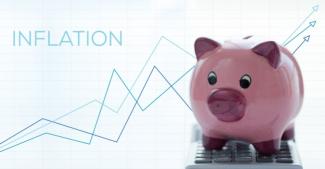
Don’t Let Inflation Ruin Your Retirement
It’s no secret that inflation and recession are dominating the news cycle, and many people are worried about how it can affect their retirement savings. With everyday costs increasing, it can be difficult to stay afloat when living on a fixed income. But that doesn’t mean your retirement has to suffer. In this article, we’ll explore 5 steps you can take to shield your retirement savings and keep inflation from ruining your golden years. Read on to learn more about how you can safeguard your future and enjoy a stress-free retirement.
Why Is Inflation a Threat?
Inflation is the general rise in the price of goods and services over time. It is a normal part of a growing economy, but over the past year, it has become a major obstacle for those who are nearing retirement or have already retired.
The Consumer Price Index (CPI), which is a common measure of inflation, ended the year with an annual inflation rate of 6.5%, still quite a bit higher than the average 2% yearly inflation numbers we’ve grown accustomed to in prior years. And the inflation rate went up another 0.5% in January, which is higher than what experts had estimated.
As the cost of goods rise, many retirees are left with a fixed amount of income for the rest of their lives. Too much of an increase in cost can quickly price retirees out of the comfortable retirement they worked so hard to build.
What Can You Do to Safeguard Your Savings?
Though inflation has continued to rear its head, thankfully there are steps you can take to minimize the impact.
-
Reassess Your Budget
The first step in overcoming inflation is to understand its impact on your overall financial plan. The unfortunate fact is that most people have unlimited wants with only limited resources. Inflation exacerbates this issue by making every dollar you earn worth less than it was worth the day before. So, a good way to cope with a high-inflation environment is to reassess your budget and make adjustments where you can.
For retirees, this might mean cutting back on discretionary expenses such as traveling, recreation, or going out to eat. You could even reassess your living situation and downsize to a smaller home or condo if it makes sense for your overall financial plan.
Reassessing your budget is an especially useful tactic when the market is in a downturn. The more you can avoid withdrawing from your portfolio to pay for everyday expenses, the better off you’ll be in the long run.
If you are aware of upcoming costs that could place strain on your finances, you can plan ahead and make cuts to other areas of spending in order to compensate. Even if you don’t expect your lifestyle to change all that much, taking a look at your budget and reassessing your spending is never a bad idea.
-
Borrow Sooner Rather Than Later
It may seem counterintuitive to take out a loan during a high-inflation environment, but inflation is actually good for borrowers. Because it causes the value of your money to decline over time, funds borrowed today will likely be paid back with money that is worth less than it was when it was originally borrowed.
This isn’t to say you should start excessively borrowing money for things you don’t need. Rather, if you know you have a large purchase coming up, like buying a home or a vehicle, borrowing sooner rather than later can enable you to get more value out of the money you’re going to spend anyway.
-
Diversify Your Income
Retirees often have several sources of income, but they are usually relatively fixed in amount. If your expenses are greater than these income sources, you may be forced to draw from your investment assets. An effective way to avoid, or reduce, portfolio withdrawals is to diversify your income. Not only could this improve your portfolio longevity and provide you with more flexibility in retirement, but it can also help minimize the impact of inflation.
Diversified income streams act in much the same way that diversified investments do. They allow for less demand on any single income source so you have the flexibility to handle increased costs or unforeseen events without depleting your portfolio reserves. There are many ways to diversify your income, including:
- Invest in real estate. Owning rental properties is a great way to earn passive income without dipping into your retirement savings.
- Continue to earn active income. You could also pursue a passion, become a freelancer, or work for a nonprofit. You might earn less than what you’re making now, but these options may provide flexibility and a form of income diversification that could keep your retirement savings safe from inflation.
- Use dividend-paying stocks. Often considered an annuity-like cash stream, dividend-paying stocks give company earnings to investors, typically once a quarter. The top dividend-paying stocks even raise their payouts over time. This not only gives you an income stream, but you can also reinvest the dividends to pursue more growth.
-
Invest in the Stock Market
Investing in the stock market is one of the best ways to outpace inflation because, historically, the rate of return of the market tends to exceed the rate at which inflation is increasing. This is because the stock market tends to rise over the long term, driven by economic growth, technological innovation, and other factors. As the stock market rises, the value of your investments can grow at a faster rate than inflation, helping you stay ahead of rising prices.
Additionally, some stocks pay dividends, which can provide a regular income stream that may keep pace with inflation. Before you dive right into investing in the market, it’s important to keep in mind that this strategy comes with risks. It’s essential to do your research and make informed decisions based on your financial goals and risk tolerance.
-
Put Idle Cash to Work
You may think that the best way to ride out the uncertainty storm is to stockpile loads of cash in the bank. While this does keep it safe from volatility, it does nothing to protect you from inflation. Each day your funds sit idle, inflation could eat away at your purchasing power. This issue can be minimized by making sure even your reserve funds are earning a competitive interest rate.
For instance, high-yield savings accounts are currently paying upwards of 4% interest. While this is still a far cry from the 6.5% inflation rate, it is much better than the 0% interest you would earn from most checking accounts.
There are other options that can improve your interest rate while still keeping your funds relatively safe, including money market accounts, certificates of deposit, and short-term Treasury bills. No matter which option you choose, managing your excess cash with inflation in mind is the best way to improve your portfolio longevity and safeguard your retirement.
Is Inflation Threatening Your Retirement?
If you’re concerned about your retirement savings due to current inflation and market conditions, don’t worry; Rosemeyer Management Group can help. Our team of professionals can provide a tailored plan to help safeguard your retirement from inflation and market volatility. Reach out to me at regan@rosemeyermg.com or schedule an introductory appointment online to take the first step toward your ideal retirement.
About Regan
Regan Shipp is an investment advisor representative at Rosemeyer Management Group, an SEC Registered Investment Advisor based in Platteville, WI. Regan is known for building relationships and looking at the whole picture of her clients’ lives to provide personalized, comprehensive wealth management services and advice. She leaves no stone unturned as she integrates investment strategies, risk management strategies, tax planning, retirement planning, and estate planning to design a plan that will help her clients pursue both financial success and freedom throughout their lives. Regan strives to educate her clients so they can feel empowered to take the actions necessary to achieve their goals. Regan is passionate about making a difference in people’s lives and loves journeying with her clients and seeing them reach new levels, surpass goals, and create wealth they might not have known was possible. Regan has a bachelor’s degree in accounting and agricultural business from the University of Wisconsin-Platteville and is a Certified Public Accountant (CPA) and CERTIFIED FINANCIAL PLANNER™ professional.
When she’s not at work, you can often find Regan spending time with her friends and family or out on a run training for a half or full marathon. Regan and her husband, Payton, their son, Lincoln, and their dog, Axel, love the outdoors and look forward to more camping, deer hunting, and beach trips. To learn more about Regan, connect with her on LinkedIn.

